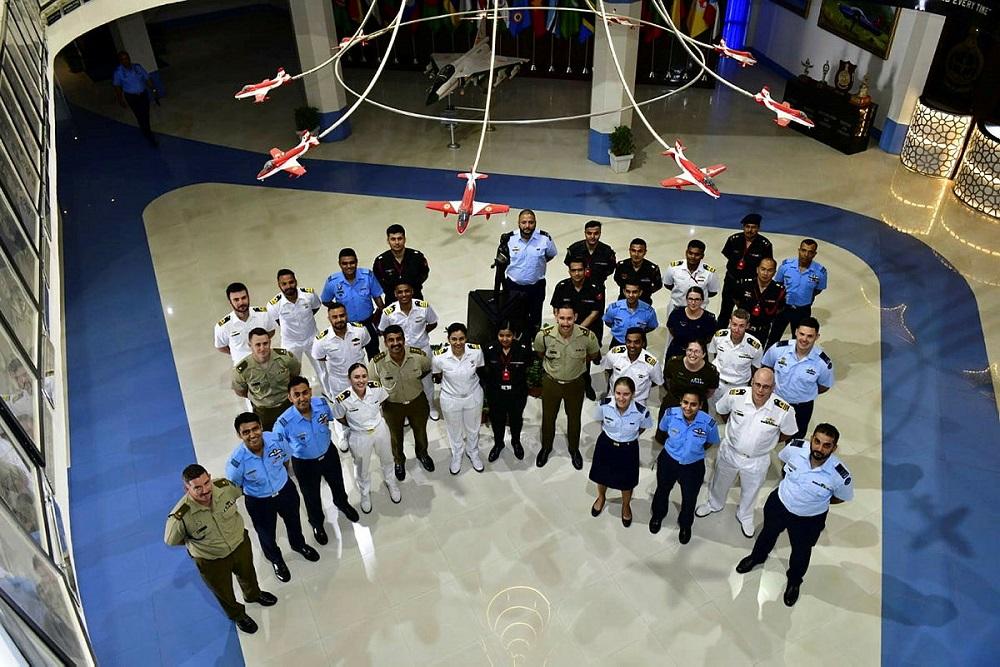Educating for effect: bolstering Australia–India military exchanges
Posted By Prakash Gopal on June 20, 2023 @ 11:15

On 2 March, Australia and India signed a landmark framework for the mutual recognition of educational qualifications, with the aim of enhancing two-way mobility [1] for students and professionals. A week later, Australian Prime Minister Anthony Albanese visited India, where, as the first foreign leader to set foot on India’s locally constructed aircraft carrier, Vikrant, he described India as a ‘top tier’ defence partner [2].
These developments are part of a significant uptick in bilateral relations. While the connection between education and defence may not be immediately apparent, professional military education is a key element of Australia’s defence relationships throughout the Indo-Pacific. With the Australia–India relationship getting a comprehensive overhaul, it’s time to leverage and build on the professional military education program to deliver outcomes that can enable greater security in the region.
Each year, two Australian Defence Force officers head to India, one to the Defence Services Staff College in southern India, and the other to the National Defence College in New Delhi. At the same time, three Indian military officers [3] head to the Australian War College in Canberra, two of whom participate in the Australian command and staff course for mid-career officers, and one in the defence and strategic studies course for more senior officers.
Both countries send their brightest military minds to these courses. Participants undergo a year of rigorous education interspersed with social and cultural exposure to their host country. This exposure is vital to developing links between the defence establishments of Australia and India, particularly as officers from these programs often go on to senior leadership roles. For instance, Vice Admiral Jonathan Meade, who headed the AUKUS submarine taskforce [4] in Australia, is a graduate of the National Defence College in New Delhi.
The annual program is supplemented by short-term and occasional exchanges. For example, an Australian naval officer completed the specialist hydrographic course [5] offered by the Indian Navy, and an Indian naval officer spent three months as a visiting research fellow [6] at the Sea Power Centre in Canberra.
In March, a group of 15 ADF officers visited India as part of the inaugural General Rawat India–Australia Young Defence Officers’ Exchange Program, which is designed to ‘foster greater understanding and cooperation [7]’ among officers in Australia and India.
Professional military education is vital for familiarisation and networking, but as the Indian and Australian defence forces draw closer, it should increasingly be focused on preparing for combined operations.
The annual mid- and senior-level exchanges have the most potential to achieve more ambitious results. Since participants rotate among different services and some will assume strategic leadership roles, further investment in these courses would have a significant impact.
These exchanges could, at a relatively small cost, be supplemented with additional bilateral or minilateral activities to promote interoperability. Australian and Indian officers could, for example, participate in scenario-based workshops and war games that require them to conduct simulated combined operations. For senior-level courses, this could also involve drafting strategies for such operations.
The scenarios could start at the lower end of the spectrum of military operations, such as humanitarian assistance and disaster relief or maritime law enforcement. They could then be scaled up to non-combatant evacuation, combined interdictions of maritime militia, or even combined special forces operations such as in hostage situations.
While the program already includes some exercises, conducting them in small, focused groups in bilateral or minilateral settings could provide officers with insights that would inform future combined operations in the region. Short modules focused on combined operations could supplement the course offerings in both countries.
In Australia, these units could be delivered at the National Security College at the Australian National University, which runs professional development courses in security and strategic studies. The Australian Civil–Military Centre and the Sea Power Centre could also deliver specialist modules.
In India, domain-focused think tanks such as the National Maritime Foundation, the Centre for Land Warfare Studies and the Centre for Air Power Studies could play this role. Exposure to non-military elements of government would also enhance officers’ understanding of the nuances of combined operations. Incrementally, the target group for these activities could be expanded to include representatives from the other Quad partners—Japan and the US.
There are many other courses that could benefit from a regular program of reciprocal engagement, and Australia and India could identify which of these could incorporate a periodic exchange program. This would contribute to sustained bilateral defence engagement at all career levels. Closer training could also set a foundation for cross-deployment of personnel on operational rotation across various military units.
The primary purpose of military training and education is to enhance operational effectiveness. Reciprocal engagement programs should be strongest between partners that may be required to operate together. The Indo-Pacific, with its numerous security challenges, is an arena where such combined operations may become an essential pillar of maintaining security. Expanding this area of bilateral defence engagement will contribute significantly to Australia and India being truly ‘top tier’ defence partners.
This article was written as part of the Australia India Institute’s defence program undertaken with the support of the Australian Department of Defence. All views expressed in this article are those of the author only.
Article printed from The Strategist: https://aspistrategist.ru
URL to article: /educating-for-effect-bolstering-australia-india-military-exchanges/
URLs in this post:
[1] two-way mobility: https://pib.gov.in/PressReleaseIframePage.aspx?PRID=1903710
[2] ‘top tier’ defence partner: https://www.abc.net.au/news/2023-03-10/albanese-declares-india-as-top-tier-security-partner/102077116
[3] three Indian military officers: https://india.highcommission.gov.au/ndli/defencerelationship27012021.html
[4] headed the AUKUS submarine taskforce: https://www.defence.gov.au/about/who-we-are/leaders/chief-nuclear-powered-submarine-task-force
[5] completed the specialist hydrographic course: https://india.embassy.gov.au/ndli/relations.html
[6] visiting research fellow: https://www.navy.gov.au/sites/default/files/documents/VNF_Edition_One_0.pdf
[7] foster greater understanding and cooperation: https://india.highcommission.gov.au/ndli/pa0123.html
Click here to print.